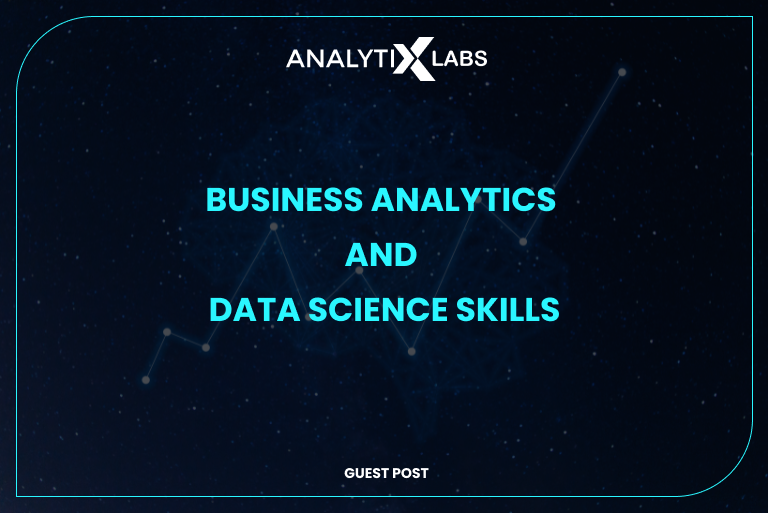In today’s data-driven world, data science and business analytics have emerged as pivotal disciplines, revolutionizing industries across the globe. The demand for expert data science professionals continues to soar as organizations recognize the potential of data-driven decision-making. Aspiring data scientists and business analysts need diverse data science skills to thrive in this dynamic field and unlock its full potential.
This article explores the critical business analytics and data science skills required for a fulfilling career in data science and business analytics, providing insights into the technical, analytical, and domain-specific proficiencies necessary to excel in this fast-evolving domain.
| Download the Data Science Salary Report 2023.
What it covers?
|
Topics covered:
- Technical skills to learn
- Data management and database skills
- Mathematics and advanced analytical skills
- Big data technologies
- Data ethics and privacy
- Problem-solving and critical thinking
- Communication and data storytelling
- Hands-on project experience
Let’s start.
Technical Skills to Learn
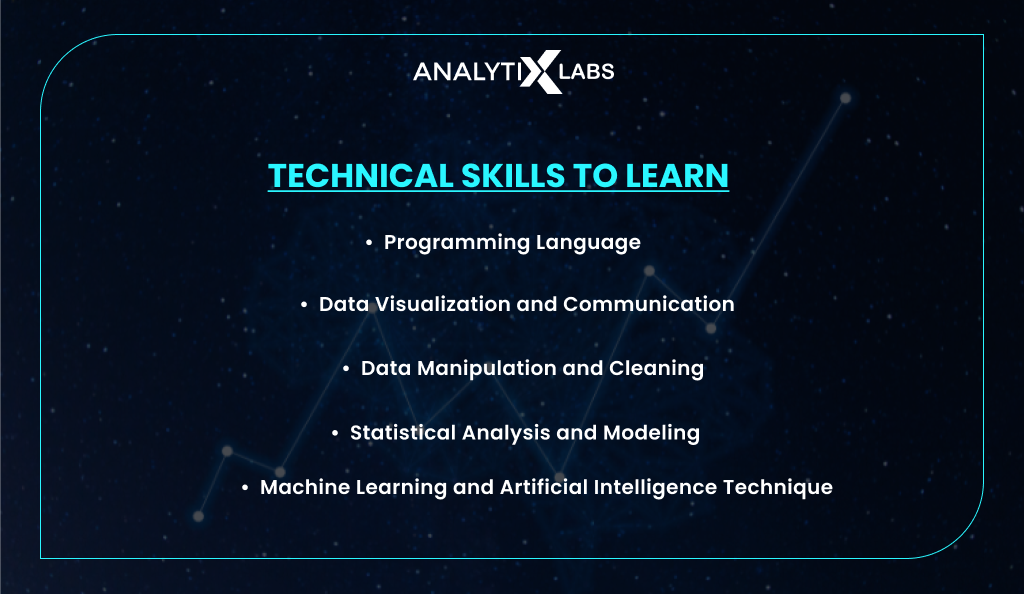
-
Proficiency in Programming Languages
Data scientists and analysts must be adept in programming languages like Python, R, and SQL to manipulate, analyze, and visualize data effectively. Python’s versatility and extensive libraries make it a preferred choice, while R is renowned for statistical analysis. SQL is essential for database querying and management, ensuring seamless data access.
-
Data Manipulation and Cleaning
Data is rarely pristine, and professionals must possess skills to clean and preprocess data for accurate analysis. Data manipulation techniques using libraries like Pandas in Python and data wrangling skills are crucial for handling diverse datasets.
-
Data Visualization and Communication
The ability to create compelling data visualizations and communicate insights effectively is invaluable. Tools like Matplotlib, Seaborn, Tableau, and Power BI enable professionals to present complex findings in an easily understandable manner.
-
Statistical Analysis and Modeling
A strong foundation in statistics is fundamental for data scientists. Understanding statistical concepts, hypothesis testing, and regression modeling is essential for drawing meaningful conclusions from data.
Also read: Fundamental Concepts of Statistics for Data Science
-
Machine Learning and Artificial Intelligence Technique
Proficiency in machine learning algorithms and AI techniques empowers professionals to develop predictive and prescriptive models. Scikit-learn, TensorFlow, and Keras are popular libraries for implementing machine learning solutions.
Data Management and Database Skills
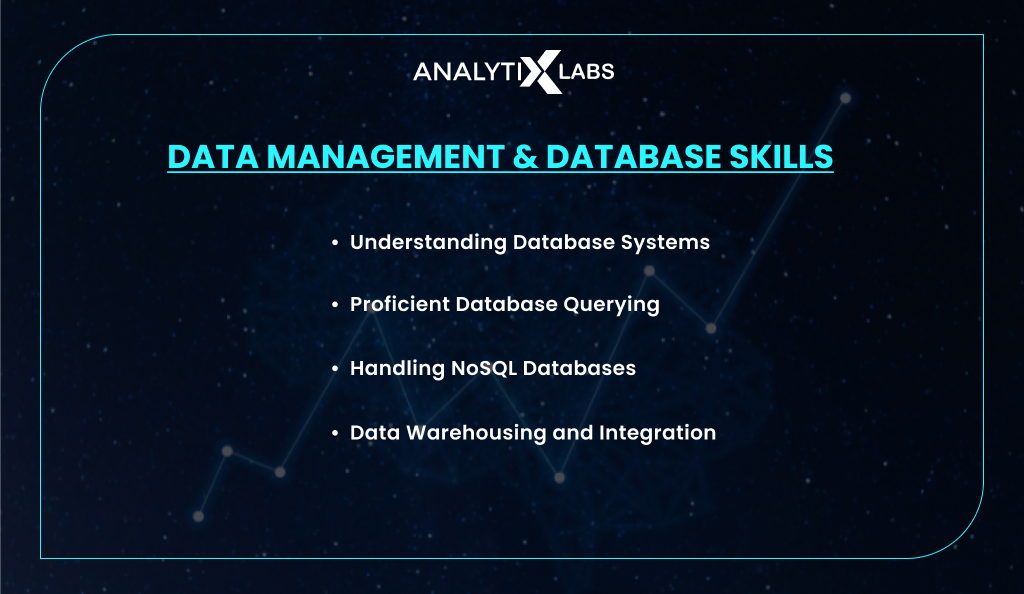
-
Understanding Database Systems
Professionals must comprehensively understand relational and non-relational databases in data science and business analytics. Relational databases, such as MySQL and PostgreSQL, are widely used for storing structured data with well-defined relationships between tables. They are essential for handling data that follows a specific schema, making them suitable for structured business data like customer information, sales records, and financial data.
Non-relational databases, like MongoDB, are designed to handle unstructured and semi-structured data. These databases are more flexible and can accommodate data with varying formats, making them ideal for dealing with big data, social media data, sensor data, and other types of information that don’t conform to a fixed schema.
-
Proficient Database Querying
Proficiency in Structured Query Language (SQL) is a fundamental skill for data scientists and business analysts. SQL allows professionals to interact with relational databases and execute powerful queries to retrieve, modify, and analyze data. Its declarative nature simplifies complex operations and makes it concisely easier to express data-related tasks.
With SQL, data professionals can filter and aggregate data, perform joins to combine information from multiple tables, and create calculated fields for in-depth data exploration. Mastering SQL querying allows data scientists to efficiently manipulate large datasets, extract specific insights, and perform advanced analytics tasks.
-
Handling NoSQL Databases
Data scientists learn from dedicated courses to have a must-skill and be familiar with NoSQL databases, which are increasingly popular due to their flexibility and scalability. NoSQL databases come in various types, including document-based, key-value, column-family, and graph databases, each tailored to specific data storage requirements.
For instance, document-based databases like MongoDB store data in JSON-like documents, making them ideal for handling semi-structured or unstructured data. Key-value stores like Redis efficiently handle data with simple key-value pairs, often used for caching or real-time applications.
Column-family databases like Apache Cassandra are designed for handling large amounts of data across distributed systems. Graph databases like Neo4j excel in managing highly connected data, making them suitable for social networks, recommendation engines, and complex relationship data.
-
Data Warehousing and Integration
Data warehousing is a critical skill for managing vast amounts of data in a centralized repository, often optimized for analytical processing. By consolidating data from multiple sources into a data warehouse, organizations can gain a unified and coherent view of their information, enabling better decision-making.
Data integration tools play a key role in the ETL (Extract, Transform, Load) process, ensuring data accuracy and consistency during migration to the data warehouse. These tools allow data scientists to extract data from different sources, convert it into a suitable format, and load it into the data warehouse for analysis.
Mathematics and Advanced Analytical Skills
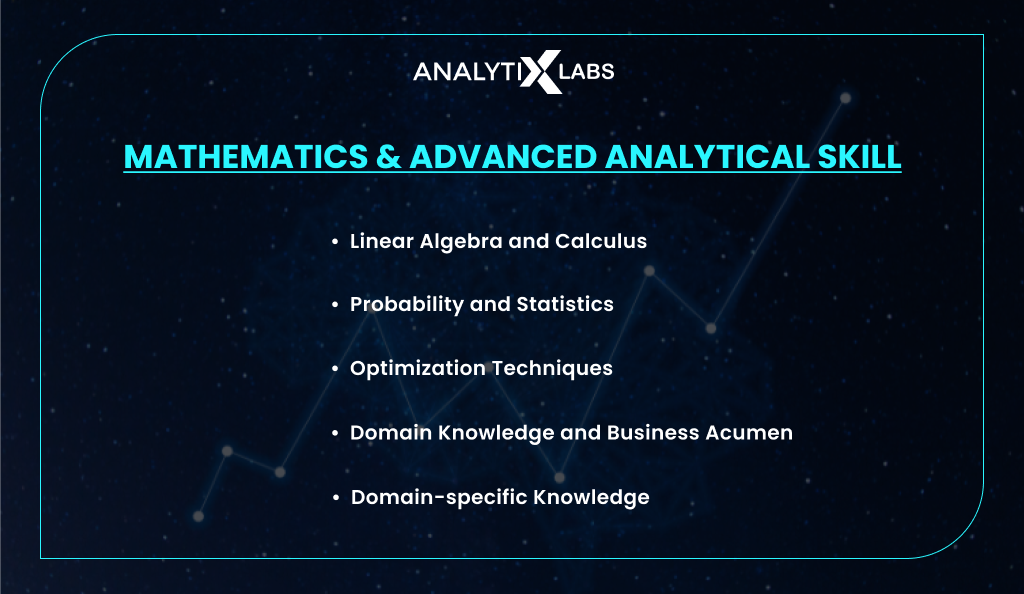
-
Linear Algebra and Calculus
The practical knowledge of linear algebra and calculus understanding is crucial for data scientists and business analysts. Linear algebra provides:
- The foundation for many machine learning algorithms.
- Helping professionals comprehend complex mathematical concepts like vector spaces.
- Matrix operations.
- Eigenvectors.
Calculus, on the other hand, facilitates the understanding of optimization algorithms and gradient-based approaches used in model training. These mathematical tools empower data professionals to develop and implement sophisticated models, making sense of vast datasets and deriving valuable insights from them.
-
Probability and Statistics
Probability theory and statistical methods are at the core of data science and business analytics. These skills enable data scientists to analyze data distributions, test hypotheses, and draw statistically sound conclusions.
With a solid grasp of probability and statistics, professionals can confidently make data-driven decisions, identify patterns in data, and quantify uncertainties. These techniques also support accurate predictions, data sampling, and designing experiments for robust analyses.
Also read: Understanding the Role of Distribution in Statistics and Data Science
-
Optimization Techniques
Optimization techniques are instrumental in developing efficient machine-learning models and solving complex business problems. Data scientists use optimization algorithms to fine-tune model parameters and optimize functions to achieve desired outcomes. By leveraging these techniques, professionals can enhance model performance, reduce computational costs, and improve overall decision-making processes.
-
Domain Knowledge and Business Acumen
In data science and business analytics, it is essential for professionals to grasp the business processes and objectives of the organization they work for. Data scientists can deliver more meaningful results and recommendations by aligning data insights with specific business goals. They can identify opportunities for process improvement, resource optimization, and revenue growth through data-driven strategies.
Also read: What is Business Forecasting
-
Domain-specific Knowledge
Expertise in specific domains, such as finance, marketing, or healthcare, adds significant value to data science projects. A deep understanding of domain-specific challenges, data sources, and industry trends allows data scientists to generate more relevant insights and tailor their analyses to the unique needs of the domain.
Domain knowledge also enables professionals to develop predictive models tailored to specific business contexts, leading to more accurate and actionable results.
Big Data Technologies
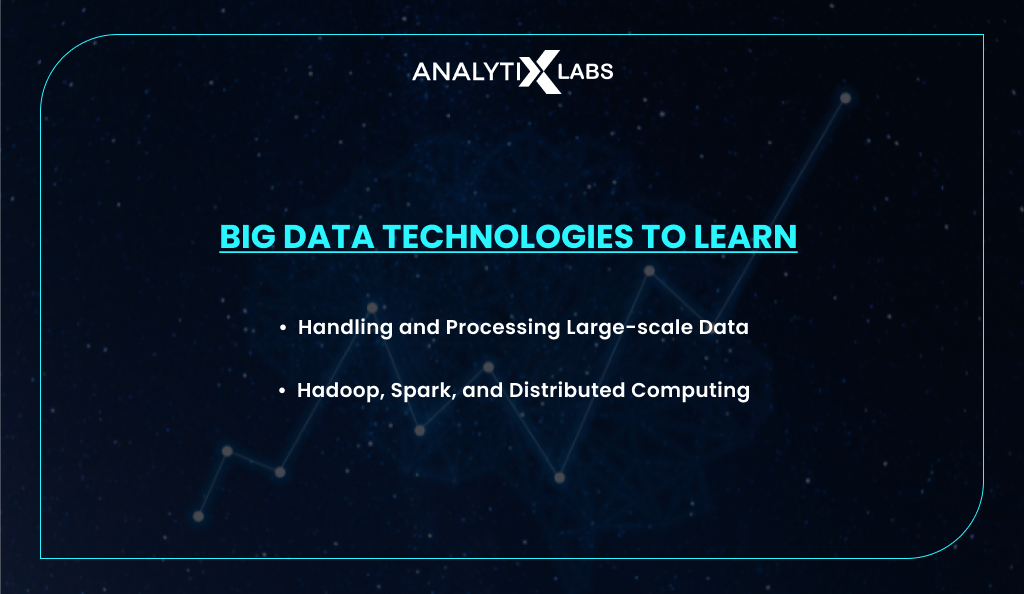
-
Handling and Processing Large-scale Data
Proficiency in big data technologies like Apache, Hadoop, and Spark is essential for processing and analyzing massive datasets efficiently.
-
Hadoop, Spark, and Distributed Computing
Skills in distributed computing frameworks are necessary to handle parallel processing and ample data storage.
Data Ethics and Privacy
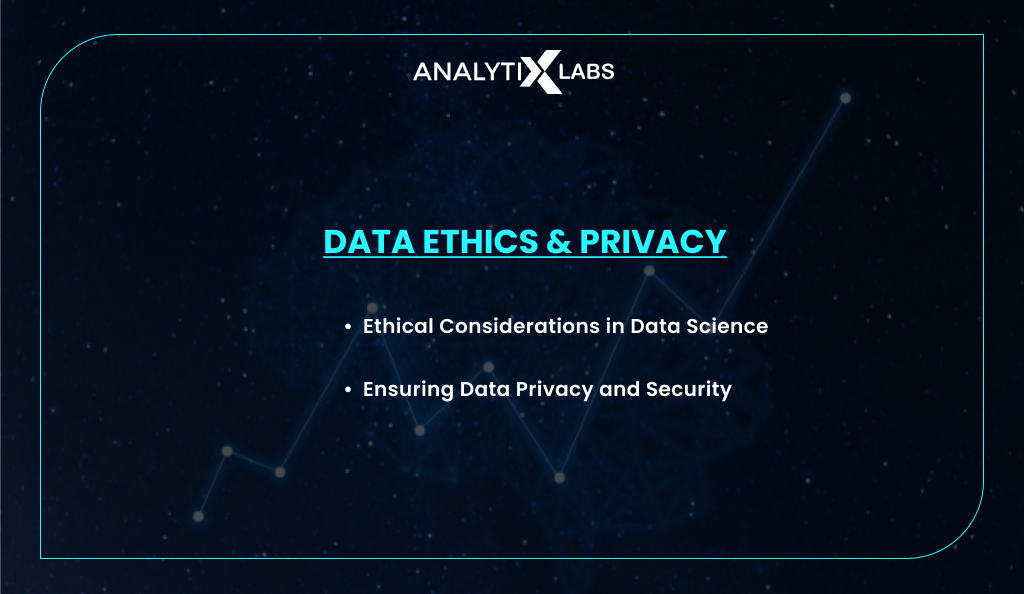
-
Ethical Considerations in Data Science
Data professionals must prioritize ethical considerations when handling sensitive data and ensuring data privacy and security.
-
Ensuring Data Privacy and Security
Understanding data governance and implementing data security measures are critical in maintaining the integrity and confidentiality of data.
Problem-solving and Critical Thinking
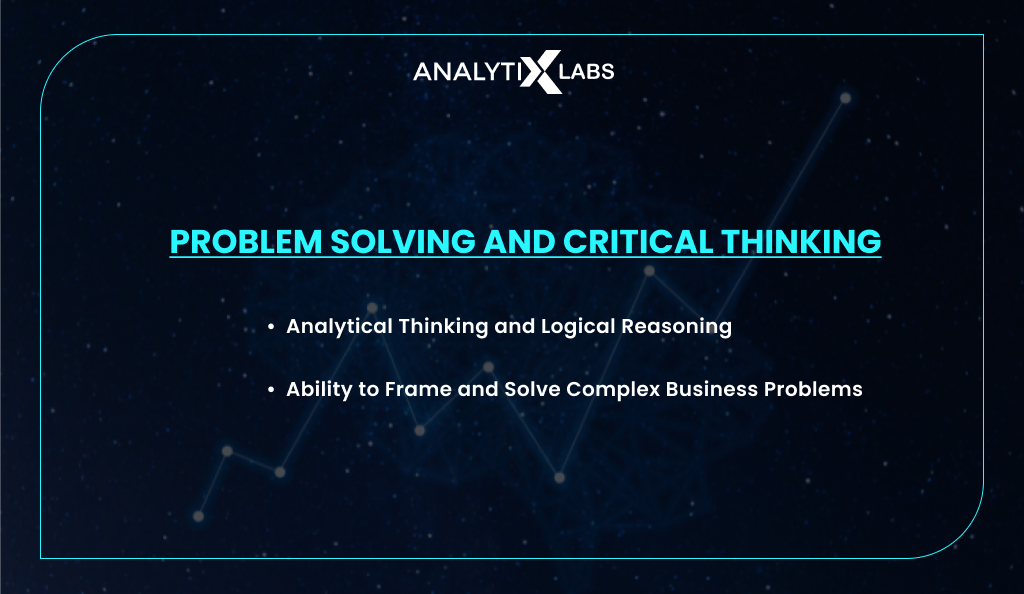
-
Analytical Thinking and Logical Reasoning
Data scientists must possess strong analytical and critical thinking skills to frame problems and devise innovative solutions.
-
Ability to Frame and Solve Complex Business Problems
The capability to address intricate business challenges using data-driven insights is key to a successful career in data science and business analytics.
Communication and Data Storytelling
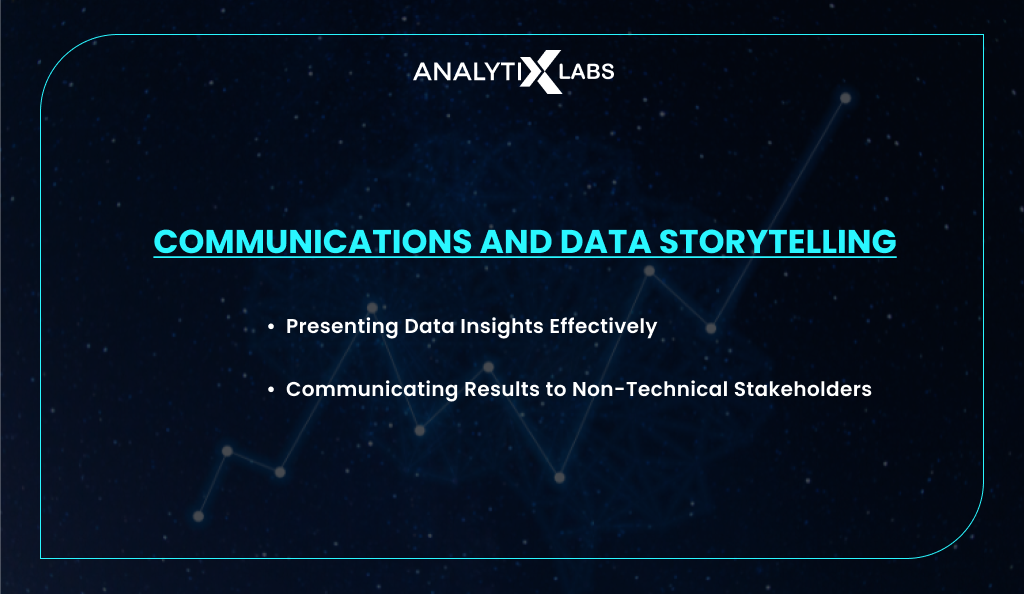
-
Presenting Data Insights Effectively
Data professionals should excel in communicating findings to non-technical stakeholders through compelling data storytelling.
-
Communicating Results to Non-Technical Stakeholders
Effectively conveying data insights to decision-makers is vital for making data-driven business decisions.
Continuous Learning and Adaptability
-
Staying Updated with Emerging Technologies and Trends
Data scientists must continuously update their skills through the Data Science and Business Analytics course to keep pace with the ever-evolving business landscape.
-
Ability to Adapt to Rapidly Changing Environments
Remaining adaptable and embracing new technologies ensures professionals remain relevant in this fast-paced domain. Working enthusiasts can continue learning newer advancements in Data Science and Business Analytics through comprehensive learning courses [online/offline], all while applying their expertise into practice in various industries.
Hands-on Project Experience
- Importance of Practical Experience in Data Science Projects
Hands-on experience in real-world projects strengthens skills and builds a strong portfolio.
- Building a Portfolio of Data Science Projects
A well-curated portfolio showcasing diverse projects demonstrates expertise and practical application of skills to potential employers.
Where to Start Learning?
Data Science and business analytics require you to know statistics, mathematics, and computer science. However, non-technical professionals can easily venture into data science and business analytics by acquiring these prerequisites or skills.
Your ideal starting point is AnalytixLabs, one of India’s premium Data Science and business analytics institutes. AnalytixLabs is a pioneer in launching a Data Science course in Delhi and a similar curriculum for Business Analytics in Bangalore.
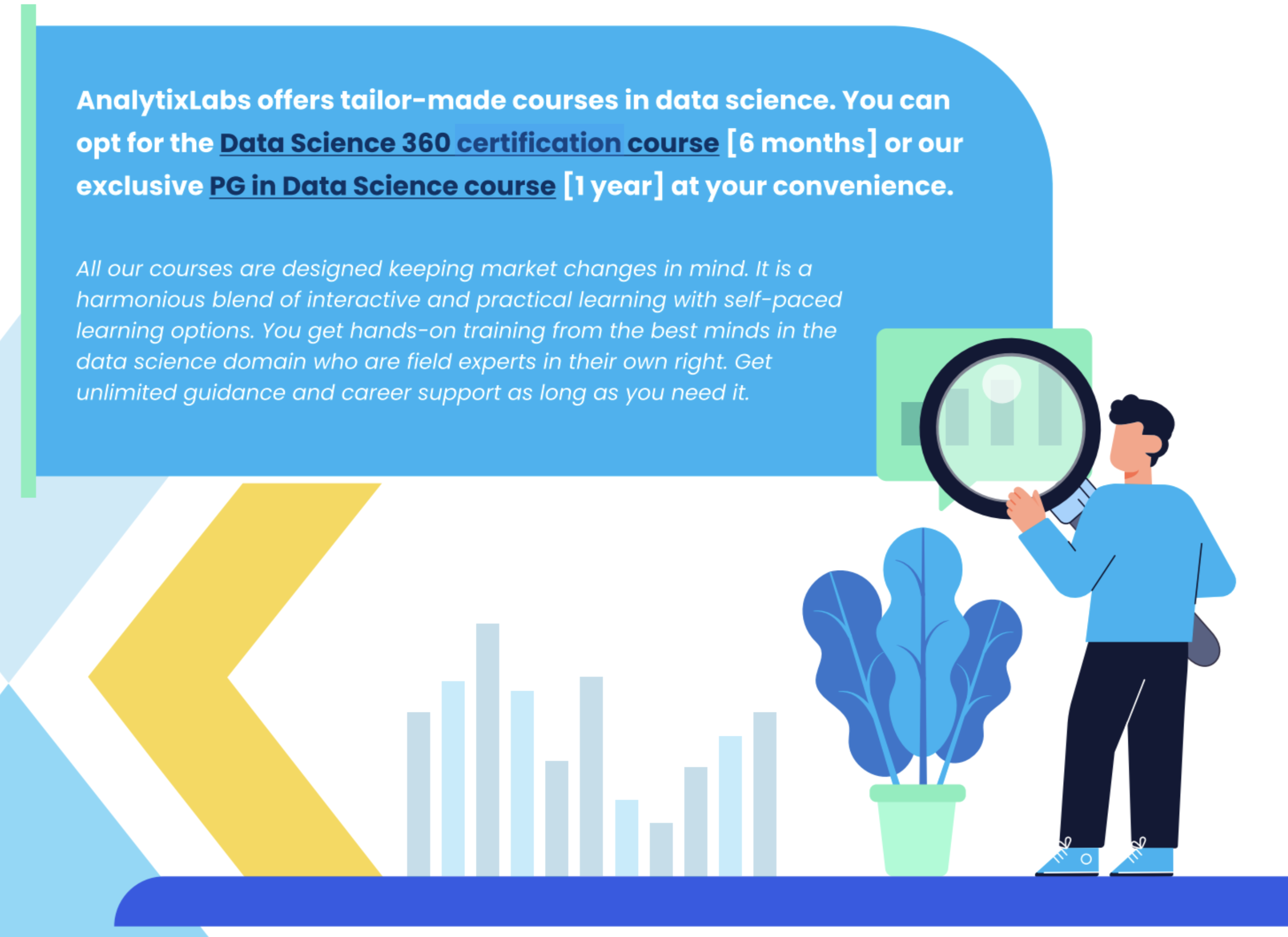
The Data Science 360 course curriculum is certified and approved by NASSCOM and the Ministry of Electronics and Information Technology. AnalytixLabs partners with IBM to offer dual certificates, helping professionals get the best out of their learning.
AnalytixLabs offers tailor-made courses in data science. You can opt for the Data Science 360 certification course [6 months] or our exclusive PG in Data Science course [1 year] at your convenience.
All our courses are designed keeping market changes in mind. It is a harmonious blend of interactive and practical learning with self-paced learning options. You get hands-on training from the best minds in the data science domain who are field experts in their own right. Get unlimited guidance and career support as long as you need it.
Similarly, you can opt for our Business Analytics Certification Course [6 months].
As an institute committed to shaping the best kinds of data scientists, we offer a 6-month job guarantee program – we guarantee placement within six months of course completion or a 100% refund of the tuition fees.
Choose your preferred mode of learning:
|
Interactive Classroom (online/offline), |
Self-paced blended eLearning |
Launch your data science and business analytics career now, or talk to us for more details and guidance. Visit analytixlabs.co.in/courses for more details.
Conclusion
A promising career in data science and business analytics demands a holistic approach to acquiring and honing critical skills. Technical acumen, domain expertise, ethical considerations, and effective communication are all essential for unlocking the potential of data in driving business success.
By continuously learning and staying adaptable, aspiring data professionals can excel in this exciting and ever-expanding field, shaping the future of industries worldwide.
Deepika plans and constantly writes on cutting-edge technologies like Data Science, Artificial Intelligence, Software Engineering, Cloud Computing, and Cyber Security. She has hands-on skills in Cryptography, blockchain technology, Data Engineering, Neuro-science, and programming languages such as C, C#, and Java. She is a perpetual learner and has a hunger to explore new technologies, enhance her writing skills, and guide others.

